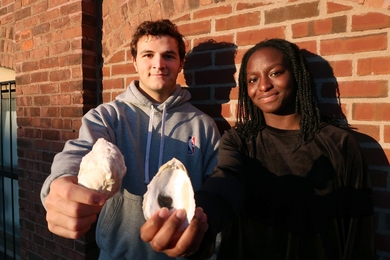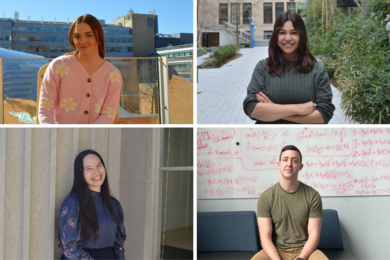Emilio Bizzi, the Eugene McDermott Professor in the Brain Sciences and Human Behavior, has been named Institute Professor, the highest honor awarded by the MIT faculty and administration.
"The rank of Institute Professor is our way of recognizing and honoring the very best of the best among our outstanding faculty," said Stephen C. Graves, the Abraham Siegel Professor of Management and chair of the faculty. "Professor Bizzi's record of scholarly accomplishment and leadership, as well as his long-standing service to the Institute, is truly exceptional. He is a most deserving member of this exclusive club, and I am delighted to see this happen."
President Charles M. Vest also lauded the appointment. "Emilio Bizzi personifies what the MIT faculty recognizes in its selection of Institute Professors. He is a world-class scientist; he has shaped MIT's approach to neuroscience and managed a smooth transition of his department into the School of Science; and, as a Fellow in the McGovern Institute for Brain Research, he plays a crucial role in the current expansion of brain and cognitive science at MIT.
"Many in our community turn to him for advice and counsel on a variety of matters, drawing on his thoughtful and insightful approach to issues."
Bizzi himself was still in "disbelief" over the appointment when interviewed by MIT Tech Talk soon after its announcement. "I haven't yet digested it," he said. "I feel very privileged to be selected."
The title of Institute Professor is reserved for those few individuals who have "demonstrated exceptional distinction by a combination of leadership, accomplishment and service in the scholarly, educational and general intellectual life of the Institute or wider academic community," according to MIT's Policies and Procedures. With Bizzi's appointment, there are now 14 Institute Professors.
The chair of the faculty and the president convene an ad hoc faculty committee to evaluate each nominee for Institute Professor, in part by soliciting opinions from professionals in the nominee's field. The committee's recommendations are reviewed by the Academic Council and approved by the Executive Committee of the Corporation.
Bizzi's committee described him as "a pioneer in the field of motor control, an area of neuroscience that deals with the generation and control of movement by the brain. He has made seminal discoveries about the way the nervous system creates and coordinates complex movements."
CAREER BEGINNINGS
Bizzi became interested in neuroscience after completing medical school in 1958 with an M.D. from the University of Rome. He went on to earn the Italian equivalent of the Ph.D. in 1968 from the University of Pisa. "I started from scratch in neuroscience," he recalled. "I was attracted to the field because I thought it was on the verge of important breakthroughs and I wanted to be part of that."
In retrospect, he said, "the real decades of the brain will be the next decades. I think that the most important discoveries will be made in the years to come. [My generation] sort of nibbled at the periphery." As a result, he added, "I wish I could be reborn and start again now."
The committee also stressed Bizzi's leadership skills. As director of the Whitaker College of Health Sciences and Technology from 1983-87 and head of the Department of Brain and Cognitive Sciences from 1986-97, he "laid the groundwork for the present visibility of the department and growth of neuroscience in the Institute."
"This is a place I love," said Bizzi. "I essentially dedicated all of my professional life to MIT, so I have an emotional tie to it."
Bizzi joined the MIT faculty in 1969 as an associate professor in what was then the Department of Psychology. His many honors and awards include election to the National Academy of Sciences, the American Academy of Arts and Sciences (he was also elected secretary in 1999) and the Italian National Academy. He has also won several awards, including two from the National Institutes of Health, in recognition of his research.
In addition to the prestige associated with the title, an Institute Professor has a distinct measure of freedom to define the scope and nature of his or her responsibilities. Reporting directly to the provost, an Institute Professor does not have regular departmental or school responsibilities. As a result, the appointment provides a special opportunity to work across departmental boundaries.
The 13 other current Institute Professors are John M. Deutch, chemistry; Peter A. Diamond, economics; Mildred S. Dresselhaus, electrical engineering and computer science (EECS) and physics; Jerome I. Friedman, physics; John H. Harbison, music and theater arts; John D.C. Little, management; Thomas Magnanti, management and EECS; Mario Molina, earth, atmospheric, and planetary sciences and chemistry; Joel Moses, EECS; Phillip A. Sharp, biology; Isadore M. Singer, mathematics; Daniel I.C. Wang, chemical engineering; and Sheila E. Widnall, aeronautics and astronautics.
A version of this article appeared in MIT Tech Talk on June 5, 2002.






